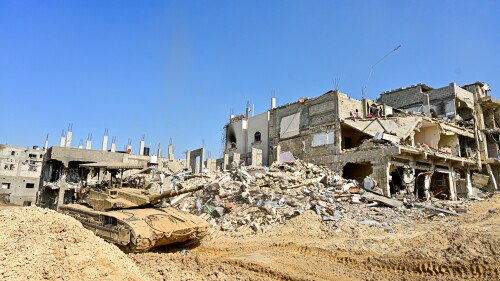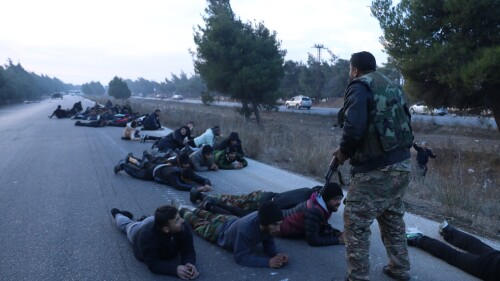Turkish-backed GNA forces (yellow) have rebounded against Egyptian-backed LNA forces (green) in recent months. |
The Libyan House of Representatives in Tobruk this week passed a motion approving Egyptian military intervention, should this prove necessary in the fight against the rival Government of National Accord (GNA) in Tripoli. This latest move is set to sharply escalate tensions in the divided and strife-torn country.
The decision raises the still remote but no longer unthinkable possibility of a conventional clash between Egyptian and Turkish forces on the soil of Libya. What began as a proxy war now threatens to escalate into a direct conflict. For now, the fighting fronts remain static around the town of Sirte. The focus looks set to return to crisis diplomacy intended to avert a direct clash over the next period. But the escalation is very real, and reflects a dangerous combination of geostrategic rivalries and long-standing ideological differences between Ankara and Cairo.
The possibility of clashes between Egyptian and Turkish forces is remote, but no longer unthinkable.
Libya is currently racked by a civil war, with Egypt and Turkey backing the opposing sides. Ankara is the main supporter of the Government of National Accord in Tripoli, led by Fayez al-Sarraj. Egypt, meanwhile, supports the rival Libyan National Army (LNA) of Field Marshal Khalifa Haftar, based in the oil-rich east of the country.
A cluster of additional international players are gathered around the two warring sides. The GNA has the additional support of Qatar and Italy. Haftar, meanwhile, enjoys the backing of the United Arab Emirates, Russia, France, Saudi Arabia and Bashar Assad’s Syria.
The present crisis was triggered by Turkish intervention in April to prevent the successful conclusion of a yearlong offensive by Haftar’s forces which had brought them to the gates of Tripoli. Without this intervention, it is likely that the war would have concluded in the Libyan capital with an LNA victory. The entry of Turkish air power and Syrian proxy forces under Turkish direction rapidly turned the tide. The GNA/Turkish side then counterattacked, driving the LNA east. The key Watiya air base fell on May 18.
On June 20, Egyptian President Abdel Fattah al-Sisi vowed that Sirte would not be allowed to fall to Turkish-backed forces. |
As Turkish-backed forces pushed toward the town of Sirte, an alarmed Egyptian President Abdel Fattah al-Sisi laid down a redline. On June 20, Sisi declared in a televised address that Sirte would not be permitted to fall to the Turkish-backed forces.
He added that “if the Libyan people asked us to intervene,” Egypt would do so.
Sirte, located 450 km. east of Tripoli, is a strategic access point to the main oil fields and oil export terminals of Libya’s east. Should it fall, the prospect would open for the eclipse of the LNA. Turkey has also declared the air base at Jufra, further east, to constitute a target that must be ceded to the GNA to make possible any ceasefire.
With Turkish-backed forces now halted outside Sirte, saber-rattling has been taking place in recent days. Turkish Defense Minister Hulusi Akar visited Libya on July 3, amid reports of preparations for an offensive.
Precision air strikes on Watiya air base by unknown aircraft on July 4 disabled the MIM-23 Improved Hawk air defense system installed by the Turks. |
Twenty-four hours after his visit, unknown aircraft struck the Watiya air base. They hit the MIM-23 Improved Hawk air defense system which the Turks had deployed at the base. In so doing, they demonstrated the vulnerability of Turkish-backed forces in the event of a push on Sirte.
The affiliation of the planes that carried out the attack remains uncertain. No state claimed responsibility. ... The Watiya raid was a deeply significant development, in that for the first time it unambiguously pitted Turkish forces directly against those of its adversaries on the Libyan battlefront. The outcome also revealed Turkish vulnerabilities.
What is the significance of recent events, and where are things likely headed?
The events in Libya reflect the depth and intensity of one of the key strategic rivalries in the Middle East. This is the contest between the camp consisting of Turkey, Qatar and a variety of Muslim Brotherhood-associated forces in the region, including Hamas’s Gaza fiefdom, and the rival gathering of Egypt, United Arab Emirates and Saudi Arabia. There are, of course, other elements engaged in the complex Libyan strategic space. But these two camps are the central players. Serraj’s GNA in Tripoli and Haftar and his allies in the east are their respective proxies.
This rivalry is not solely geostrategic. It relates also to modes of governance. Turkey had hoped to emerge at the head of a bloc of democratically elected Islamist governments in the region, following the outbreak of the Arab Spring in 2010-11. For a while, things seemed to be going well. The election of the Muslim Brotherhood to power in Egypt in 2012 was the high point. Turkey strongly backed the government of Mohamed Morsi. It similarly threw its weight behind the Sunni Islamist insurgents in Syria. For a moment, the prospect of a bloc of Sunni Islamist governance stretching from Ankara to Cairo (and incidentally, threatening Israel from north and south) looked like a real possibility.
Sisi’s military coup in July 2013, backed and probably financed by the UAE and Saudi Arabia, ended this brief moment, and began a period of retrenchment by existing Arab elites. The bitterness remains.
The war in Libya is the latest iteration of a long struggle between military/monarchical regimes and Islamists.
The geopolitics of the Arab world has long mainly consisted of a battle between military and monarchical regimes on the one hand, and Islamists on the other. The clash between Turkey and Egypt in Libya is at root the latest iteration of this long struggle, the difference being that the Sunni Islamists now have a powerful, ambitious and militarily capable state (Turkey) at the head of their camp.
As of now, it is Turkey’s move. Ankara has climbed up a high tree with its declarations that an offensive into Sirte remains an obligation if Haftar and his allies refuse to quit the area. Ankara needs, however, also to consider the broader diplomatic picture before attempting any such move.
Turkey makes no serious pretense of acting in accordance with Western interests in Libya.
There appears to be little support from the European Union or United States for aggressive moves further east into Libya, given the incendiary potential of an offensive toward Sirte and the oil fields, and taking into account that Turkey, while still a NATO member, makes no serious pretense of acting in defense of, or in accordance with, Western interests.
Conversely, and perhaps most importantly, Russia is engaged in Libya and has Mig-29 aircraft stationed at the Jufra air base. Fighters from the Russian Wagner company were also deployed with the LNA and had to retreat across the desert after the fall of the Watiya air base.
Moscow appears to have abandoned the notion of an absolute victory for the LNA. Foreign Minister Sergei Lavrov said that Haftar’s forces would be willing to sign an immediate ceasefire. But this conciliatory attitude might well not extend to toleration for a Turkish push further east. This would raise the possibility of Turkish forces facing a Russian retaliation, without US or EU support. Such a prospect is likely to give Turkey’s president pause for thought.
Still, the Turkish-Egyptian standoff before Sirte indicates that the old divide that has dominated Middle East politics for so long – between generals and Islamists – remains pertinent. Now, however, this contest has moved from the public squares of the Arab Spring to the state-to-state level.
Jonathan Spyer is director of the Middle East Center for Reporting and Analysis and a Ginsburg/Ingerman Writing Fellow at the Middle East Forum.










